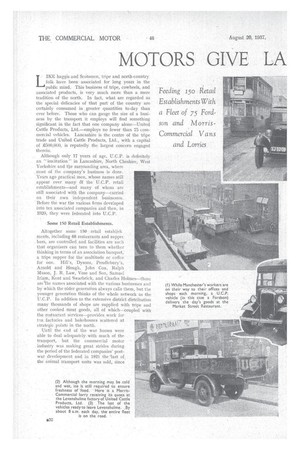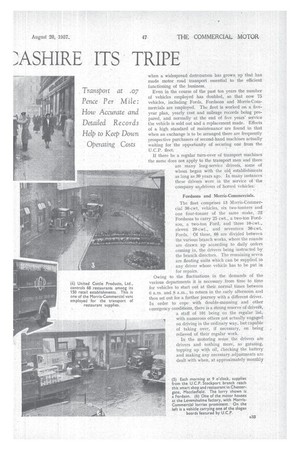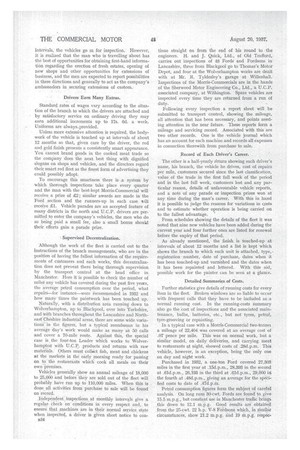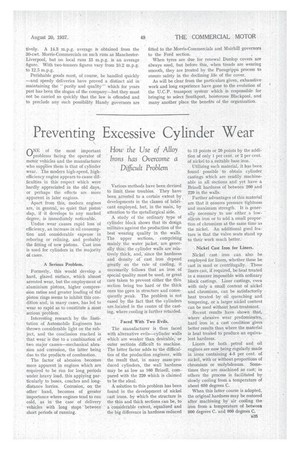MOTORS GIVE LA ASHIRE ITS TRIPE
Page 42

Page 43

Page 44

Page 45

If you've noticed an error in this article please click here to report it so we can fix it.
L• IKE haggis and Scotsmen, tripe and north-country folk have been associated for long years in the public mind. This business of tripe, cowheels, and associated products, is very much nmre than a mere
tradition of the north. In fact, what are regarded as the special delicacies of that part of the country are certainly consumed in greater quantities to-day than ever before. Those who can gauge the size of a business by the transport it employs will find something significant in the fact that one company alone—United Cattle Products, Ltd.—employs no fewer than 75 commercial vehicles. Lancashire is the centre of the tripe trade and United Cattle Products, Ltd., with a capital of R500,000, is reputedly the largest cbricern engaged therein.
Although only 17 years of age, U.C.P. is definitely an " institution" in Lancashire, North Cheshire, West Yorkshire and the surrounding area, where . most of the company's business is done. Years ago practical men, whose names still appear over many af the U.C.P. retail establishments—and many of whom are still associated with the company—carried on their own independent businesses. Before the war the various firms developed into ten associated companies and then, in 1920, they were federated into U.C.P.
Some 150 Retail Establishments.
Altogether some 150 retail establish meats, including 68 restaurants and suppet
. bars, are controlled. and facilities are such that organizers can turn to them whether thinking in terms of an association banquet, a tripe supperfor the multitude or coffee for one. Hill's, Dysons, Pendlebury's, Arnold and Hough, John Cox, Ralph Mason, J. R. Law, Vose and Son, Samuel
Irlam, Kent and Swarbrick, and Charles Holmes—those are the names associated with the various businesses and by which the oldergeneration always calls them, but the younger generation thinks of the whole network as the
U.C.P. In addition to the extensive district distribution many thousands of shops are supplied with tripe and
other cooked meat goods, all of which—coupled with the restaurant services—provides work for tsat factories and bakehouses scattered at .,trategic points in the north.
Until the end of the war horses were able to deal adequately with much of the transport, but the commercial motor industry was making great strides during the Period of the federated companies postwar development and in 1921 the 'last of the animal transport units was sold, since when a widespread distribution has grown up that has made motor road transport essential to the efficient functioning of the business.
Even in the course of the past ten years the number of vehicles employed has doubled, so that now 75 vehicles, including Fords, Fordsons and Morris-Com mercials are employed. The fleet is worked on a fiveyear plan, yearly cost and mileage records being pre pared, and normally at the end of five years' service the vehicle is sold out and a replacement made. Effects of a high standard of maintenance are found in that when an exchange is to be arranged there are frequently prospective purchasers of second-hand machines actually waiting for the opportunity of securing one from the U.C.P. fleet.
If there be a regular turn-over of transport machines the same does not apply to the transport men and there are many long-service drivers, some of whom began with the old establishments as long as 30 years ago. In many instances these drivers were in the service of the company af-Arivers of horsed vehicles.
Fordsons and Morris-Commercials.
The fleet comprises 13 Morris-Commercial 30-cwt. vehicles, six two-ton ners and one four-tanner of the same ,make, 22
Fordsons to carry 25 cwt., a two-ton Fordson, a two-ton Ford, and three 10-cwt., eleven 20-cwt., and seventeen 30-cwt. Fords. Of these. 68 are divided between the various branch works, where the rounds are drawn up according to daily orders coming in, the drivers being instructed by the branch directors. The remaining seven are floating units which can be supplied to any driver whose vehicle has to be put in for repairs.
Owing to the fluctuations in the demands of the various departments it is necessary from time to time for vehicles to start out at their normal times between 6 a.m. and 8 a.m., to return in the early afternoon and then set out for a further journey with a different driver.
In order to cope with double-manning and other emergency conditions, there is a strong reserve of driver's, a staff of 101 being on the regular list, with numerous others not actually engaged on driving in the ordinary way, but capable of taking over, if necessary, on being relieved of their regular work.
In the motoring sense the drivers are drivers and nothing more, as greasing, topping up with oil, Checking the battery and making any necessary. adjustments are dealt with when, at approximately monthly intervals, the vehicles go in for inspection. However, it is realized that the man who is travelling about has the best of opportunities for obtaining first-hand information regarding the erection of fresh estates, opening of new shops and other opportunities for extensions of business, and the men are expected to report possibilities in these directions and generally to act as the company's ambassadors in securing extensions of custom.
Drivers Earn Many Extras.
Standard rates of wages vary according to the situation of the branch to which the drivers are attached and by satisfactory service on ordinary driving they may earn additional increments up to 17s. 6d. a week. Uniforms are always.provided.
Unless more extensive attention is required, the bodywork of the vehicle is touched up at intervals of about 12 months so that, given care by the driver, the red and gold finish presents a consistently smart appearance. You cannot brand goods in the cooked meat trade so the company does the next best thing with dignified slogans on shops and vehicles, and the directors regard their smart red fleet as the finest form of advertising they could possibly adopt.
To encourage this smartness there is a system by which thorough inspections take place every quarter and the man with the best-kept Morris-Commercial will receive a prize of £2; similar awards are made in the Ford section and the runners-up in each case will receive £1. Vehicle parades are an accepted feature of many districts in the north and U.C.P. drivers are permitted to enter the company's vehicles, the men who do so being paid a small fee, also a small bonus should their efforts gain a parade prize.
Supervised Decentralization.
Although the work of the fleet is carried out to the instructions of the branch managements, who are in the position of having the fullest information of the requirements of customers and each works, this decentralization does not prevent there being thorough supervision by the transport control at the head office in Manchester. Here it is possible to check the number of mike any vehicle has covered during the past five years, the average petrol consumption over the period, what repairs—for instance—were recommended in 1932 and how many times the paintwork has been touched up.
Naturally, with a distribution area running down to Wolverhampton, up to filackpool, over into Yorkshire, and with branches throughout the Lancashire and Northeast Cheshire industrial areas, there are some wide variations in the figures, but a typical roundsman in his average day's work would make as many as 50 calls and cover a 70-mile route. Against this, the special case is the four-ton Leader which works to Wolverhampton with U.C.P.. products and returns with raw materials. Others must collect fish, meat and chickens at the markets in th6 early morning ready for passing on to the restaurants which cook all meals on their own premises.
Vehicles generally show an annual mileage of 18,000 to 25,000 and before they are sold out of the fleet will probably have run up to 110,000 miles. When this is done all activities from purchase to sale will be found on record.
Independent inspections. at monthly intervals give a regular. check on conditions in every respect and, to ensure that machines are in their normal service state when inspected, a driver is given short notice to con
534 tinue straight on from the end of his round to the engineers. H. and J. Quick, Ltd., of Old Trafford, carries out inspections of 48 Fords and Fordsons in Lancashire, three from Blackpool go to Thomas's Motor Depot, and four at the Wolverhampton works are dealt with at Mr. H. Tyldesley's garage at Willenhall. Inspections of the Morris-Commercials are in the hands of the Sherwood Motor Engineering Co„ Ltd., a U.C.P. associated company, at Withington. Spare vehicles are inspected every time they are returned from a run of duty.
Following every inspection a report sheet will be submitted to transport control, showing the mileage, all attention that has been necessary, and points needing attention in the near future. These reports form a mileage and servicing record. Associated with this are two other records. One is the vehicle journal which has an account for each machine and records all expenses in connection therewith from purchase to sale.
Record of Each Driver's Career.
The other is a half-yearly return showing each driver's name, his branch, the vehicle he drives, cost of repairs per mile, customers secured since the last classification, value of the trade in the first full week of the period and in the last full week, customers lost and any particular reason, details of unfavourable vehicle reports, and a note of any parade or inspection prizes won at any time during the man's career. With this in hand it is possible to judge the reasons for variations in casts and to estimate whether operation is being carried on to the fullest advantage.
From schedules showing the details of the fleet it was noted that nine new vehicles have been added during the current year and four further oties are listed for renewal before the expiry of that period.
As already mentioned, the finish is touched-up at intervals of about 12 months and a list is kept which shows the branch to which each unit is attached, type, registration number, date of 'purchase, dates when it has been touched-up and varnished and the dates when it has been repainted and lettered. With this aid, possible work for the painter can be seen at a glance.
Detailed Summaries of Costs.
Further statistics give details of running costs for every item in the fleet. Broken windows are so liable to occur with frequent calls that they have to be included as a normal running cost. In the running-costs summary also go the 'cost of inspections and the associated maintenance, bulbs, batteries, etc., but not tyres, petrol, tyre-grooving or repainting.
In a typical case with a Morris-Commercial two-tonnei a mileage of 22,404 was covered at an average cost of .07 pence per mile. This was on normal work, but a similar model, on daily deliveries, and carrying meat to restaurants at night, showed costs of .28i.p.m, This vehicle, however, is an exception, being the only one on day and night work.
Purchased in 1932, a one-ton Ford covered 27,303 miles in the first year at .15d.p.m., 28,393 in the second at .61d.p.m„ 26,193 in the third at .61d.p.m., 29,000 int the fourth at .48d.p.m., giving an average for the specified costs to date of .47d.p.m.
Petrol consumption figures form the subject of careful analysis. On long runs.30.-cwt. Fords are found to give 15.5 m.p.g., but constant use in Manchester traffic brings this down to 121 m.p.g. Good results are obtained from the 25-cwt. 22 h.p. V-8 Foidsons which, in similar circumstances, show 21.2 m.p.g. and 19 m.p'.g. respec
tively. A 14.3 m.p.g. average it obtained from the 30-cwt. Morris-Commercials on such runs as ManchesterLiverpool, but on local runs 13 m.p.g. is an average figure. With two-tonners figures vary from 10.2 m.p.g. to 12.5 m.p.g.
Perishable goods must, of course, be handled quickly —and speedy deliveries have proved a distinct aid in maintaining the "purity and quality" which for years past has been the slogan of the company—but they must not be carried so quickly that the law is offended and to preclude any such possibility Handy governors are fitted to the Morris-Commercials and Muirhill governors to the Ford section.
When tyres are due for renewal Dunlop covers are always used, but before this, when treads are wearing smooth, they ate treated by the Pneugrippa process to ensure safety in the declining life of the cover.
As will be clear from the particulars given, exhaustive work and long experience have gone to the evolution of the U.C.P. transport system which is responsible for bringing to select Southport, boisterous Blackpool, and many another place the benefits of the organization.




















































































